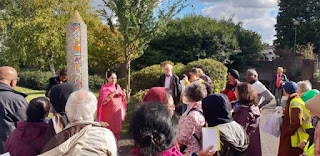International Day of Friendship
On International day of friendship why not speak out for oppressed or bullied people in your communities? Here I was speaking at Westminster Cathedral highlighting the persecution of Christians in Pakistan.
Many of you will never have heard of the International day of Friendship, which is the very reason I write this blog. The special day was devised by UNESCO and ratified by the UN at their General Assembly in 1997, yet since then the day has been celebrated little.
The day itself has some very inspirational objectives and I list their 8 areas of action which they promote to nations, organisations and individuals to foster global peace:
These are laudable aspirations and I can think of no better way to improve society then to extend a hand of friendship, one that has no bearing on a persons culture, status, faith or other background.
We are so used to seeing campaign groups seeking changes to laws, policies and practices that discriminate. They all seek a world where they will be accepted for who they are despite their differences and this makes so much sense, as we are all so unique.
We should grasp the opportunity this day gives us with both hands. Ways we could bring change in our communities on a personal level include:
- Helping elderly people get to shops or to undertake house duties for a day to make them feel cared for and special and not forgotten.
- Organising community fun days and other events that bring diverse people together.
- Running an anti-bullying campaign, especially ones that involve people interacting with those who have been bullied and perhaps the sharing of accounts of bullying, so people understand the impact of what they do.
- Hold seminars or print a school/local magazine that counters the culture of stereotyping.
- Or simply setting up a friendship centre in your local town that allows anybody to sit, eat and drink and have a chat with someone new.
- Hold an anti knife event or interfaith harmony in a central borough location.
I spoke at Redbridge Peace Pole at Redbridge Faith Forum's annual peace event.
I personally am involved with Redbridge Friendship Centre in my former home town. Every month for one week the East Ilford Betterment Partnership partners with other local community groups and faith groups and hold a stall where free food and drink is served, and people could just sit down and rest their weary legs. Moreover a team of local people from the amalgamated groups is present for people to have a chat.
On the side of the stall a banner that say's 'Redbridge Friendship Centre - Free Drink and a Chat' attracted many visitors.
Conversations could be anything, such as football, the cricket world cup, faith, fashion or whatever visitors want to talk about. The experience was very rewarding and the stall was very popular with over 1600 people taking advantage of the opportunity over 18 months. It gave me my first opportunity to talk with homeless people and over time we developed a set of pathways to other services to share with them. We also served many new migrant communities, and for me, personally I find it very rewarding when those we have met say hello when I am in the town centre, remembering the small contribution I made to their lives.
I want to develop a certain aspect of my friendship work further by creating a non-alcoholic bar for teenagers. Discussions held with young people at the Friendship stall suggested that many would like more community services available to them.
Young people can become isolated despite being in busy schools because of the different peer pressures that interfere with their lives - especially when a teacher is not around. The bar will be one in which young people of all diversities are welcomed and have the opportunity to socialise in smaller groups in a safe, supervised environment. They will also be able to access local statutory services and community group/charity services through the knowledge provided during 10 minute presentations by local stalwarts and officers. This empowerment will enable them to live safer and more productive lives and may even thwart the growing social malaise of teen-knife crime.
I have initaited a crowd funding campaign to raise funds for my non-alcoholic bar for teenagers. You can read more (here)







Comments
Post a Comment